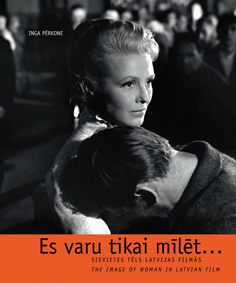|
|
 The Image of Woman in Latvian Film The Image of Woman in Latvian Film Mārtiņš Slišāns, Film Critic Inga Pērkone. To Love is all I can do... (Rīga, Neputns, 2008) | |
|
To love is all I can do... This is a book by the film theorist Inga Pērkone, which reveals the presentation of the image of woman in Latvian film and how that image has changed over the course of the century. This work, which follows her previous book: Films in Latvia. 1920-1940 is a testimony to Pērkone as one of the most interesting personalities among contemporary Latvian film theorists and critics. This brief insight, scientifically accurate, however written in a captivating manner and intended for a wide audience, could be devoted to the title alone. It seems that these few words - "to love is all I can do..." - contain the universal quintessence of femininity and convey both the happiness and the tragedy of women, both in real life and on screen. The voice and the echo of this utterance is made even more symbolic by the cover photo showing a scene from the film Purva bridējs, where we see Edgars, performed by Uldis Pūcītis, with his head resting on Kristīne's shoulder, performed by Vija Artmane. Her face is like an icon. An image expressing a whole range of meanings, where any descriptive words would be redundant to that which is felt with the heart. The book, which has been formatted according to the highest criteria of good taste, adds another aspect to the study of Latvian cinematography: a clearly structured exploration of female roles in Latvian film, viewed from a historical perspective. From the full-blooded screen versions of Mērnieku laiki by the brothers Kaudzīši and Aija by Jaunsudrabiņš, to the woman-doll images offered in the latest films by director Una Celma - that is the scope of the book. Milda Klētniece, Dzidra Ritenberga, Velta Līne, Astrīda Kairiša, Lilita Ozoliņa, Akvelīna Līvmane, Rēzija Kalniņa - the names of these actresses and the gallery of their screen heroines as forming a whole mental stratum of Latvian cinema. And, of course, Vija Artmane - as a woman and a film star. | |
 Inga Pērkone. To Love is all I can do...: The Image of Woman in Latvian Film. Rīga, Neputns, 2008, 224 pages: il. | |
|
The entire concluding chapter of the book is devoted to the actress, as befits a canon of excellence. Pērkone's narrative is substantial and dense, but at the same time without excessive digression. Her references to processes in the history of cinema, both in the West and the East, are pleasingly erudite and in just the right measure. Significant reference points in the book are derived from gender studies, which have been increasingly attracting attention in the world since the 1970s, but are becoming topical in the patriarchal Latvian society only now. There are also references to modern feminist classics, starting with the works by Simone De Beauvoir, the spouse of Jean-Paul Sartre. If this perspective, which regards the woman as an individual defined by history, social conditions and culture (not as a biological, emotional or spiritual being) and at the same time points to a certain tendentiousness in gender studies were to be the only viewpoint, then this book could be simply placed back on the shelf of specialized literature for theorists and researchers. Fortunately, that is not the case. The feeling of dryness in the mouth that the reader might get from a few passages of scholarly text (which any research literature cannot avoid, unless it is aiming to become a layman's publication,) is livened up by emotionally shaded descriptions. As a result, Pērkone's narrative is like a river, flowing between the intellectual and the emotional, between the right and the left bank, and finding a balance in this flow. /Translator into English: Vita Limanoviča/ | |
| go back | |







